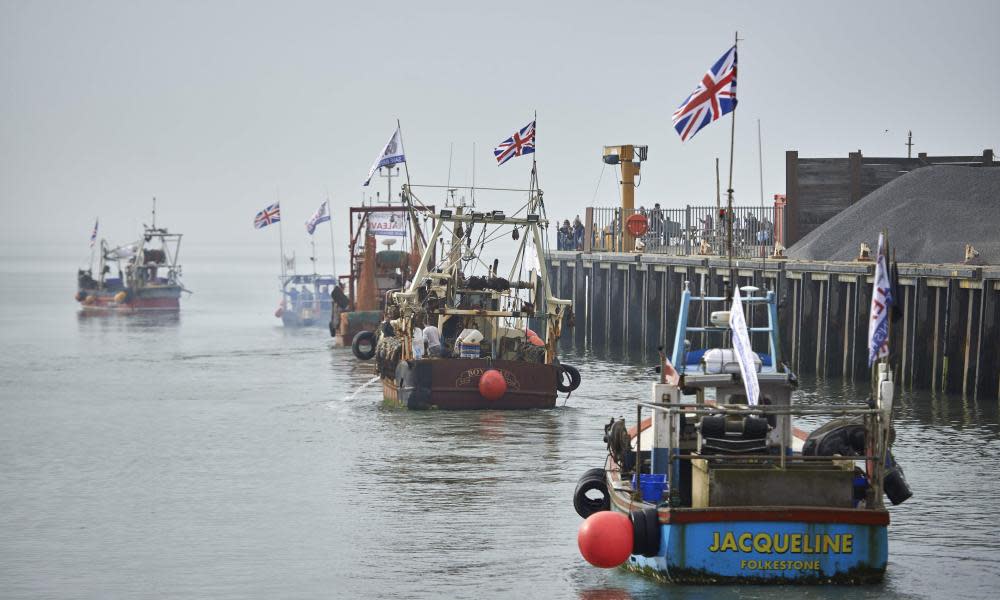Hard Brexit would mean more and cheaper British fish – but there's a catch

A hard Brexit that banned EU fishermen from UK waters would lead to many more fish being landed by British boats and a corresponding drop in prices, according to new economic analysis.
But there’s a catch. Two-thirds of the fish UK consumers eat are imported from overseas, and the costs of those would rise, due to the trade barriers resulting from a hard Brexit. Moreover, the fall in the price of UK fish would lead to a drop in earnings for UK fishermen. Overall, the analysis shows closing the UK’s sea borders would be a “lose-lose situation” for both UK and EU consumers and fishing industries.
The issue of fishing has become one of the most highly charged Brexit issues. The current EU system is perceived as unfair, with vessels from other EU nations landing 10 times more fish from UK waters than vice versa.
Ministers have said UK boats will catch hundreds of thousands of tonnes more fish after Brexit. But fishermen have repeatedly expressed fears that the ministers will not “take back control” of UK waters, but instead will trade away access to British waters in exchange for access to other markets. In March, the UK government angered the industry by conceding that EU fishing rules will remain in place until 2020.
The new analysis was conducted by researchers at Wageningen University & Research (WUR) in the Netherlands, rated the world’s top university for agricultural research. It found that 10-15% more fish would be landed by UK vessels in the hard Brexit scenario from 2020-2025, worth £250m over the period. But this increased supply would push prices down, and overall the UK fleet would earn less, the study indicated.
Furthermore, the UK imports almost twice as much fish as it exports, with the top five being cod, tuna, prawns, salmon and haddock. The impact of a hard Brexit on trade would make these more expensive, the researchers found. The impact would also hit UK fish farms, which export most of their products, and the fish processing industry, which relies on imports.
“While the domestic fish price goes down, the price of the imported fish goes up quite a lot,” said Heleen Bartelings at WUR. “There is also an impact on [farmed fish] and processed fish products – both become more expensive. So it is only a small part of the UK fish sector that is less expensive and the rest is more expensive.”
She said the apparent opportunity for the UK to “cash in” by closing marine borders is scotched by the analysis. “Overall, the advantage of an increased fish access is completely outweighed by the costs of protectionism,” the report concluded.
The EU nations that would be most affected by the end of access to UK waters in the analysis were Ireland, Belgium and the Netherlands, whose fishing fleets catch 35-45% of their fish in UK. Ireland also imports a lot of fish from the UK. “The Irish consumers will lose out the most, as we see fish prices there rising up to 9%,” said Bartelings.
Prof Bryce Beukers-Stewart, a fisheries expert at the University of York, UK, said: “What is interesting is they have taken a very broad view, unlike a lot of the other analyses.” This includes assessing impacts on both the UK and other EU nations, examining how changes in wild fisheries impact on farmed fish sales and how prices change.
”It shows a familiar story – that the implications of Brexit are so much more complicated than the simple campaign message of ‘taking back control’ led people to believe,” Beukers-Stewart said, adding that he thinks a total ban on foreign vessels is unlikely as things stand.
The increased fish caught in UK waters by UK boats in the hard Brexit scenario would be species such as blue whiting, herring and sand eels, Beukers-Stewart said: “There is not a huge appetite for these in the UK, to put it mildly.”
But fisherman Aaron Brown, founder of the Fishing for Leave group, disagrees that the UK would lose out from a hard Brexit: “We regain approximately 600,000 tonnes net from a clean Brexit. Prices may drop short term but eventually they will recover as the UK processing industry also rebuilds.”
“If the UK regains what should be rightfully her resources, implements new UK policy to address both EU and domestic failings, then the future can be very bright for British fishing,” he said.
Helen McLachlan, at WWF-UK, said the new analysis held no surprises: “We import most of what we eat and export most of what we catch.” She said a good Brexit transition could see new rules enabling both a healthy ocean and a thriving fishing industry.
The WUR analysis employed a widely used economic model and also tested to see how much changing the necessary assumptions affected their conclusions. The overall “lose-lose” outcome of a hard Brexit in fisheries remained in all circumstances, with only the scale of losses being different. “We have good trust in our results,” said Bartelings.

 Yahoo News
Yahoo News 
